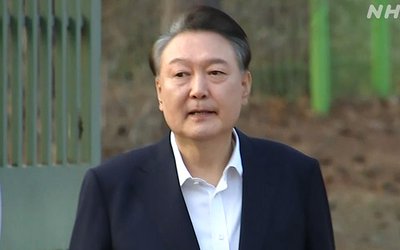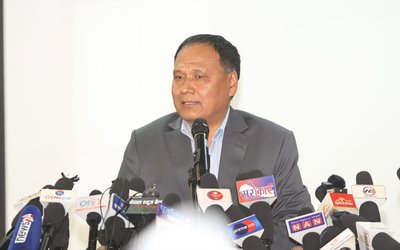
At a time when the government is talking about the need to hold the elections for local bodies, what sense does it make to announce new municipalities?
This is not only an announcement of the new municipalities. It is part of territorial reforms. Actually, it has been due for a long period of time. For the last fifteen years, the government had not announced any new municipality. Among South Asian countries, Nepal’s urban population growth is the highest, at over 6 percent per annum. In this context, this was just the need of the hour. Since we don’t have a scheme for mergers of the VDCs, the government initiated the territorial reforms by announcing municipalities. After this, local bodies will be more capable and efficient financially, geographically and socially. Municipalities are the strength of the state because they help promote corporate culture. Along with this, they will also help improve the infrastructure like water, road and market. The announcement of municipalities will also generate revenues on their own to develop infrastructure. So far as elections are concerned, that is a political issue. In terms of policy and legal requirements, there is no obstruction at all to hold the local elections. However, it is the job of the politicians to take the decision. Even if the elections are held, they will deepen democracy in the municipality than in the VDCs. Contesting the election for mayorship is more prestigious than as a chairperson of VDC. Urbanization is the future. If the government fails to make a proper decision on urban development now, it will be more chaotic and unorganized, becoming impossible to correct, in the future. The global trends also show that more than fifty percent of the population will live in urban areas by 2050. In case of Nepal, almost fifty percent people live in the urban areas the floating population is taken into account. Municipalities were the need and necessity of the time.
The new municipalities are announced on the basis of suggestion of experts and consent of the local people.
With the announcement of the municipalities, Village Development Committees are defunct. Where can people get the services now?
The municipalities will provide better services than the Village Development Committees because there will be more employees than the VDCs would have. Of course, one cannot see such services now, but the municipalities will be better equipped in the future than any VDCs. There will be different office layouts for municipalities. The government will provide fire brigades, vehicles and garbage management equipment as well. As the urban centers are growing haphazardly, municipalities will implement the building codes. Municipalities will also help increase the revenues. Of course, the services will deteriorate initially. However, the new municipalities will provide better services in the future.
What about the state of the municipalities now?
Nepal has now 191 municipalities. There will be a few more in the future as there are some potential areas for proposed municipalities. The cabinet has given us a mandate to study technical parts and discuss with the local people to turn their places into municipalities.
What are the challenges?
The challenges before us are not to announce the new municipalities but how to reduce the number of Village Development Committees. After the announcement of the new municipalities, 3276 VDCs remain there now. In the present situation, we need to reduce the number of municipalities by merging many VDCs into one municipality. This is the prerequisite to improve the service delivery. The VDCs were not made with the purpose to provide the services as the delivery units. The VDCs were established as grass root units to certify and for inventory purposes. These units were designed not for development purposes but for administrative purposes. In the present context, VDCs cannot solve the development complications. There is a global trend of territorial reform of local bodies as big cities. Certain countries even have taken the merger incentives and development incentives. We are giving development incentives through the people’s participation. The government cannot do everything alone. Implementation of building code and construction of earthquake safe houses are not only the duty of municipalities but they are equally the responsibility of the individuals. To bring the team spirit at the local level, there is a need to develop a corporate culture. The municipalities have been announced keeping in mind the idea of governance and governability.
At a time when there has been no local election for almost 16 years, how do you justify taking the reforms at this juncture?
There is always a greater reform opportunity in the transition period. Solution of reform is reform. We cannot wait for a long period of time. Our aim is to create the conducive environment. Instead of pushing the local bodies in more chaotic and unmanageable situations, it is better to make them manageable.
What is the state of division of wards now?
All the new municipalities are divided into several wards. The decisions have already been taken during the period of technical study. As the boundaries of the wards are decided on the consent of local people, there is not much dispute and controversy. Until the holding of the new elections, the municipalities will be under the government employees.
What is the state of Local Governance Act amendment bill?
The government has already tabled the bill in the Legislature Parliament and now it is under the consideration of a parliamentary committee. There is an intensive debate on the bill in committee. There is no debate over the fundamental issue of the bill. The debate is just over the interpretation of the bill.
How do you see the possibility of holding the elections then?
If there is a political consensus, we can hold the elections. Even the Election Commission is saying that it is possible to hold the local elections. We don’t have an technical problem.
At a time when there is are debates going on over federalism, don’t you think the ministry’s decision is one taken in a haste?
Federalism is not a panacea for power sharing. The announcement of new municipalities will help federalism. Local governments should be more powerful in the federal structure. People here think that provinces will be more powerful in federalism. This is completely wrong. There is a threat to recentralization not decentralization in case of giving all powers to the provinces.
Our experiences have shown that the municipalities are more self centered and self sustainable in generating resources. There are many municipalities in the country which are self sufficient, that is, in reducing the government’s grant. For example, no one imagined Itahari will expand in such a manner. As recently announced municipalities are within the range of highways, they will also flourish as Itahari did. There is a high potential in the highways. We cannot speak of the situation of new municipalities by living in the confines of Kathmandu. Let’s go to the places. We need to have better dreams for those municipalities than the present ones. New municipalities need to plan on their own. The Ministry will also provide necessary technical support to them. The ministry can lead, as different institutions are responsible for work in the field. The municipalities have a high potential. We need support from different institutions to improve the situation. It is not only the responsibilities of MOFAD to make our places better to live in.
Now, how sustainable are they at the moment?
The government has been allocating large sums of money to Village Development Committees. If they are sustainable, there is no question about the sustainability of municipalities, which also can generate the revenues on their own. Nepal’s recent experiences have shown that given the opportunity, municipalities can generate resources on their own.
In terms of the rural-urban linkages, the municipalities can play a very important role. The new municipalities can be the driving engines for the village development committees adjoining them. The municipalities can make the linkages with the village development committees.
One cannot change the rural settings just by hanging the signboard of municipality. All responsible institutions need to work together to transform the place. The population living in the municipalities should have the commitment for this. To improve the physical conditions, the commitments of city dwellers are more important. MOFAD is just a facilitator in the whole process. The strength lies in the local areas. What they need to do is to reduce the weakness and increase the strength. Increased activities in the municipal areas will ultimately support national economy. Those municipalities announced in 1995 have drastically changed the overall scenario of the region. They will increase the economic activities and that will help generate the revenues. Municipalities will increase the economic activities. The new ones will reduce the pressure on the other urban sectors. We cannot stop the rural urban migration but the new municipalities will reduce it. In eastern parts of Nepal, rural urban migration has drastically come down following the announcement of the municipalities.
How do you visualize the overall change?
Village Development Committees, Municipalities and District Development Committees can play an important role in bringing about transformations of the country. There is a delivery deficit not only from the local bodies but there is a deficit of governance. Although the Ministry is given all the responsibility to make the service delivery at the grassroots level, MOFLD is receiving just 7.28 percent of local budget. There is a high expectation among the people. People living in the urban areas are confused.
- IME GROUP: Expands Into Paper Industry
- Mar 24, 2025
- CPN UML: Instigated By India
- Mar 23, 2025
- ADB’S CHIEF ECONOMIST: Nepal Reduces Poverty
- Mar 11, 2025
- FM DR. DEUBA: A Successful Visit
- Mar 11, 2025
- MD GHISING: Target Of Personal Grudge
- Mar 09, 2025















